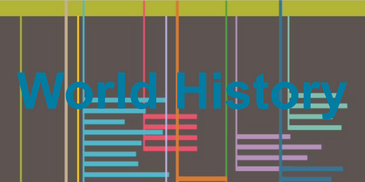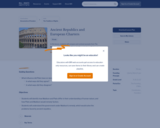
This inquiry kit has sources from the Library of Congress about the importance of Egyptian religion in the world history.
- Subject:
- Social Science
- Material Type:
- Lesson
- Provider:
- PBS Learning Media
- Date Added:
- 03/22/2024

This collection contains highly recommended World History lessons, activities, and other resources from the eMedia library.

This inquiry kit has sources from the Library of Congress about the importance of Egyptian religion in the world history.

In this lesson, students will compare and contrast excerpts from The Republic of Plato and selected Federalist Papers by James Madison to determine in what ways Madison agreed and disagreed with Plato, regarding human nature the proper role of government in a society. What influence did Plato have on James Madison and the writers of the Constitution? In what ways did they agree? In what ways did they disagree?

Art History Teaching Resources (AHTR) is a peer-populated platform for educators who use visual and material culture in their teaching practice. Home to an evolving and collectively authored repository of open educational content, AHTR serves as a collaborative virtual community for art history instructors at all stages of their academic and professional careers.

Three lesson plans including classroom activities, assignments, homework, and keys. Lesson 1: Gift of the Nile, map, worksheet, visual literacy, Lesson 2. Barter Beer and Bread, Lesson 3. Nile, Red Sea, and Mediterranean Trade

In this lesson, students explore some of the religious and cultural variations and diversity within Islam, as well as the relation of Muslims to members of other religious groups.

This 3-module course demonstrates how the Introduce-Investigate-Intersect-Introspect model can be utilized to explore religious identity formation within Jewish traditions.

Examine clay tablet found in the Metropolitan Museum of Art.

Students read about and discuss the impact of the invention of the wooden plow on agricultural output, farmers, and consumers. They will use the wooden plow example to identify the potential relationships between agricultural innovations and food output, improved standards of living, and the population of ancient societies.

Lesson for hands-on activity to use clay and create Indus River seals.

The Four Social Revolutions refers to the indentification of social change through modes of subsitance. Examines hunter-gatherers, pastoral, horticultura, agrarian, industrial, and post-industrial.

In this interactive lesson supporting literacy skills, students are introduced to the ancient Mayan civilization through their writings. Students develop their literacy skills as they explore a social studies focus on the destruction of many Mayan writings by the Spanish and what archaeologists have learned from the writings that remain. During this process, they read informational text, learn and practice vocabulary words, and explore content through a video and interactive activities